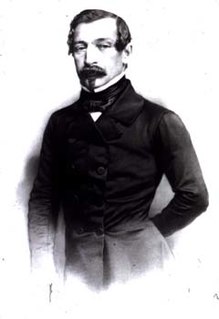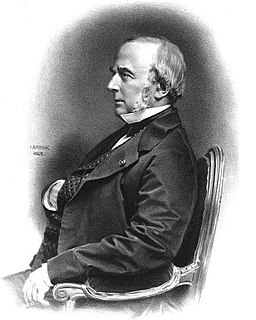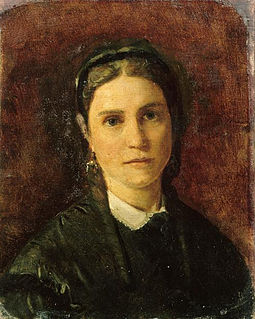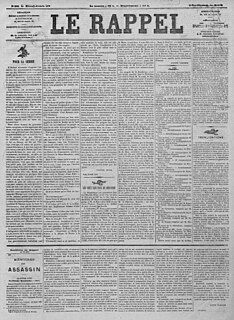
Victor Marie Hugo was a French poet, novelist, and dramatist of the Romantic movement. During a literary career that spanned more than sixty years, he wrote abundantly in an exceptional variety of genres: lyrics, satires, epics, philosophical poems, epigrams, novels, history, critical essays, political speeches, funeral orations, diaries, letters public and private, and dramas in verse and prose.
La Légende des siècles is a collection of poems by Victor Hugo, conceived as an immense depiction of the history and evolution of humanity.

Giuseppe Ferrari was an Italian philosopher, historian and politician.

Jean Baptiste Marius Augustin Challamel was a French historian.

Auguste Vacquerie (1819–1895) was a French journalist and man of letters.

The French coup d'état of 2 December 1851 was a self-coup staged by Charles Louis-Napoléon Bonaparte. Code-named Operation Rubicon and timed to coincide with the anniversary of Napoleon I's coronation and victory at Austerlitz, the coup ended in the successful dissolution of the French National Assembly and the subsequent re-establishment of the French Empire the next year. When he faced the prospect of having to leave office in 1852, Louis-Napoléon staged the coup in order to stay in office and implement his reform programs; these included the restoration of universal male suffrage. His political measures, and the extension of his mandate for 10 years, were popularly endorsed by constitutional referendum. A year later, the Prince-President reclaimed his uncle's throne as Emperor of the French under the regnal name Napoleon III.

Juliette Drouet, born Julienne Josephine Gauvain, was a French actress. She abandoned her career on the stage after becoming the mistress of Victor Hugo, to whom she acted as a secretary and travelling companion. Juliette accompanied Hugo in his exile to the Channel Islands, and wrote thousands of letters to him throughout her life.
Jean-François-Anne Landriot was a French bishop, Ordained in 1839 from the seminary of Autun, he became, after a few years spent at the cathedral, successively superior of the seminary, 1842; vicar-general 1850; Bishop of La Rochelle, 1856, and Archbishop of Reims, 1867.

Paul Meurice was a French novelist and playwright best known for his friendship with Victor Hugo.

Adèle Hugo was the fifth and youngest child of French writer Victor Hugo. She is remembered for developing schizophrenia as a young woman, which led to a romantic obsession with an Irish military officer who rejected her. Her story has been retold in film and books, such as The Story of Adèle H.

PS Normandy was a British paddle-wheel mail steamer operating on the Southampton - Guernsey - Jersey route which, on a night of dense fog, sank 20 miles from The Needles in the English Channel in the early morning of 17 March 1870 after colliding at around 03:30 with steamship Mary, a propeller steamer carrying 500 tons of maize from Odessa to London via Gibraltar.
Charles Bénézit was a French musician, writer, and music teacher.

François-Victor Hugo was the fourth of five children of French novelist Victor Hugo and his wife Adèle Foucher. François-Victor is best known for his translations of the works of William Shakespeare into French, which were published in 18 volumes between 1859 and 1866.

Adolphe Vuitry was a French lawyer, economist and politician. He became recognized as an expert on finance. He was governor of the Banque de France from 1863 to 1864, then Minister-President of the Conseil d'Etat from 1864 to 1869. In his later years he devoted himself to historical studies, publishing many works on medieval and modern finance.
Paul Huillard was a French designer and architect who collaborated on many projects with Louis Süe.

Eugène Guinot was a French journalist, writer and playwright, creator of the Parisian chronique

Théodore César Muret was a 19th-century French playwright, poet, essayist and historian.
Abuffard Eugène Augustin Woestyn was a 19th-century French playwright, librettist, poet, journalist, chansonnier and writer.

Léonie Thévenot d’Aunet was a French author, novelist, playwright and Arctic explorer.

"Pour la Serbie" is the title of a speech written by Victor Hugo, on 29 August 1876, castigating massacres perpetrated by the Turks in Serbia. It was first published as an open letter in the French newspaper Le Rappel, later included in the last volume of Actes et Paroles, Hugo's collected political writings, entitled Depuis l'exil.















